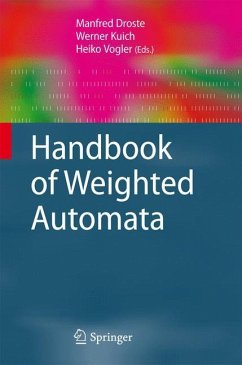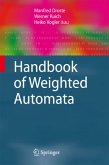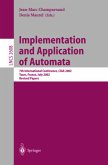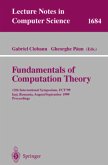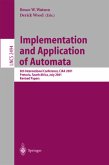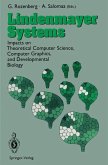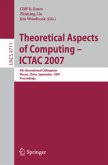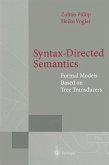This book covers all the main aspects of weighted automata and formal power series methods, ranging from theory to applications. The contributors are the leading experts in their respective areas. Chapters offer pointers to future research.
The purpose of this Handbook is to highlight both theory and applications of weighted automata. Weighted finite automata are classical nondeterministic finite automata in which the transitions carry weights. These weights may model, e. g. , the cost involved when executing a transition, the amount of resources or time needed for this,or the probability or reliability of its successful execution. The behavior of weighted finite automata can then be considered as the function (suitably defined) associating with each word the weight of its execution. Clearly, weights can also be added to classical automata with infinite state sets like pushdown automata; this extension constitutes the general concept of weighted automata. To illustrate the diversity of weighted automata, let us consider the following scenarios. Assume that a quantitative system is modeled by a classical automaton in which the transitions carry as weights the amount of resources needed for their execution. Then the amount of resources needed for a path in this weighted automaton is obtained simply as the sum of the weights of its transitions. Given a word, we might be interested in the minimal amount of resources needed for its execution, i. e. , for the successful paths realizing the given word. In this example, we could also replace the "resources" by "profit" and then be interested in the maximal profit realized, correspondingly, by a given word.
The purpose of this Handbook is to highlight both theory and applications of weighted automata. Weighted finite automata are classical nondeterministic finite automata in which the transitions carry weights. These weights may model, e. g. , the cost involved when executing a transition, the amount of resources or time needed for this,or the probability or reliability of its successful execution. The behavior of weighted finite automata can then be considered as the function (suitably defined) associating with each word the weight of its execution. Clearly, weights can also be added to classical automata with infinite state sets like pushdown automata; this extension constitutes the general concept of weighted automata. To illustrate the diversity of weighted automata, let us consider the following scenarios. Assume that a quantitative system is modeled by a classical automaton in which the transitions carry as weights the amount of resources needed for their execution. Then the amount of resources needed for a path in this weighted automaton is obtained simply as the sum of the weights of its transitions. Given a word, we might be interested in the minimal amount of resources needed for its execution, i. e. , for the successful paths realizing the given word. In this example, we could also replace the "resources" by "profit" and then be interested in the maximal profit realized, correspondingly, by a given word.
"This book is an excellent reference for researchers in the field, as well as students interested in this research area. The presentation of applications makes it interesting to researchers from other fields to study weighted automata. ... One of the main arguments in favor of this handbook is the completeness of its index table - usually a faulty section in such volumes. The chapters are globally well-written and self-contained, thus pleasant to read, and the efforts put to maintain consistency in vocabulary thorough the book are very appreciable." (Michaël Cadilhac, The Book Review Column 43-3, 2012)
"The book presents a broad survey, theory and applications, of weighted automata, classical nondeterministic automata in which transitions carry weights. ... The individual articles are written by well-known researchers in the field: they include extensive lists of references and many open problems. The book is valuable for both computer scientists and mathematicians (being interested in discrete structures)." (Cristian S. Calude, Zentralblatt MATH, Vol. 1200, 2011)
"The book presents a broad survey, theory and applications, of weighted automata, classical nondeterministic automata in which transitions carry weights. ... The individual articles are written by well-known researchers in the field: they include extensive lists of references and many open problems. The book is valuable for both computer scientists and mathematicians (being interested in discrete structures)." (Cristian S. Calude, Zentralblatt MATH, Vol. 1200, 2011)
From the reviews:
"This book is an excellent reference for researchers in the field, as well as students interested in this research area. The presentation of applications makes it interesting to researchers from other fields to study weighted automata. ... One of the main arguments in favor of this handbook is the completeness of its index table - usually a faulty section in such volumes. The chapters are globally well-written and self-contained, thus pleasant to read, and the efforts put to maintain consistency in vocabulary thorough the book are very appreciable." (Michaël Cadilhac, The Book Review Column 43-3, 2012)
"The book presents a broad survey, theory and applications, of weighted automata, classical nondeterministic automata in which transitions carry weights. ... The individual articles are written by well-known researchers in the field: they include extensive lists of references and many open problems. The book is valuable for both computer scientists and mathematicians (being interested in discrete structures)." (Cristian S. Calude, Zentralblatt MATH, Vol. 1200, 2011)
"This book is an excellent reference for researchers in the field, as well as students interested in this research area. The presentation of applications makes it interesting to researchers from other fields to study weighted automata. ... One of the main arguments in favor of this handbook is the completeness of its index table - usually a faulty section in such volumes. The chapters are globally well-written and self-contained, thus pleasant to read, and the efforts put to maintain consistency in vocabulary thorough the book are very appreciable." (Michaël Cadilhac, The Book Review Column 43-3, 2012)
"The book presents a broad survey, theory and applications, of weighted automata, classical nondeterministic automata in which transitions carry weights. ... The individual articles are written by well-known researchers in the field: they include extensive lists of references and many open problems. The book is valuable for both computer scientists and mathematicians (being interested in discrete structures)." (Cristian S. Calude, Zentralblatt MATH, Vol. 1200, 2011)
From the reviews:
"This book is an excellent reference for researchers in the field, as well as students interested in this research area. The presentation of applications makes it interesting to researchers from other fields to study weighted automata. ... One of the main arguments in favor of this handbook is the completeness of its index table - usually a faulty section in such volumes. The chapters are globally well-written and self-contained, thus pleasant to read, and the efforts put to maintain consistency in vocabulary thorough the book are very appreciable." (Michaël Cadilhac, The Book Review Column 43-3, 2012)
"The book presents a broad survey, theory and applications, of weighted automata, classical nondeterministic automata in which transitions carry weights. ... The individual articles are written by well-known researchers in the field: they include extensive lists of references and many open problems. The book is valuable for both computer scientists and mathematicians (being interested in discrete structures)." (Cristian S. Calude, Zentralblatt MATH, Vol. 1200, 2011)

